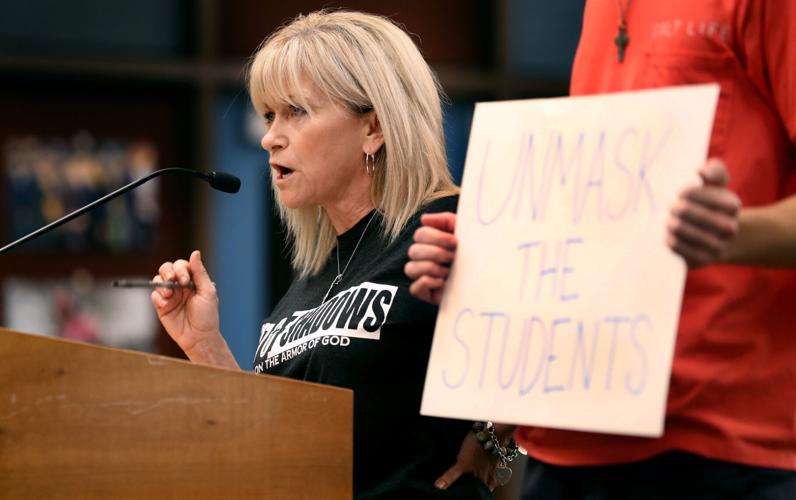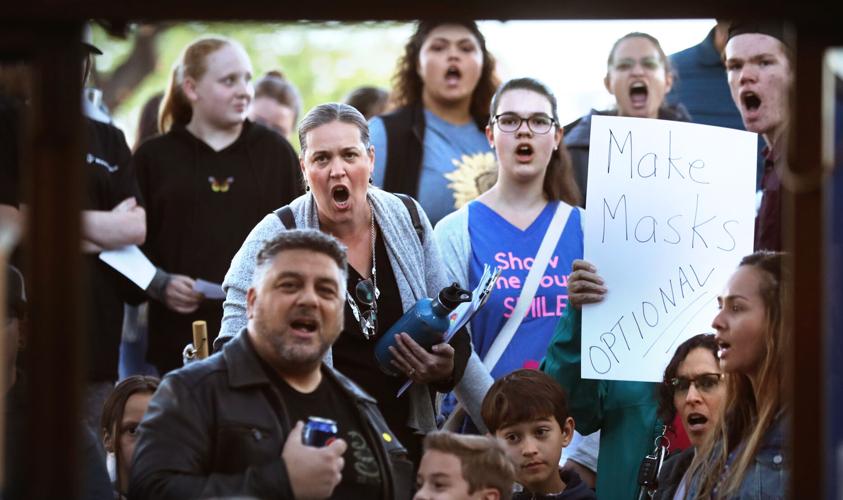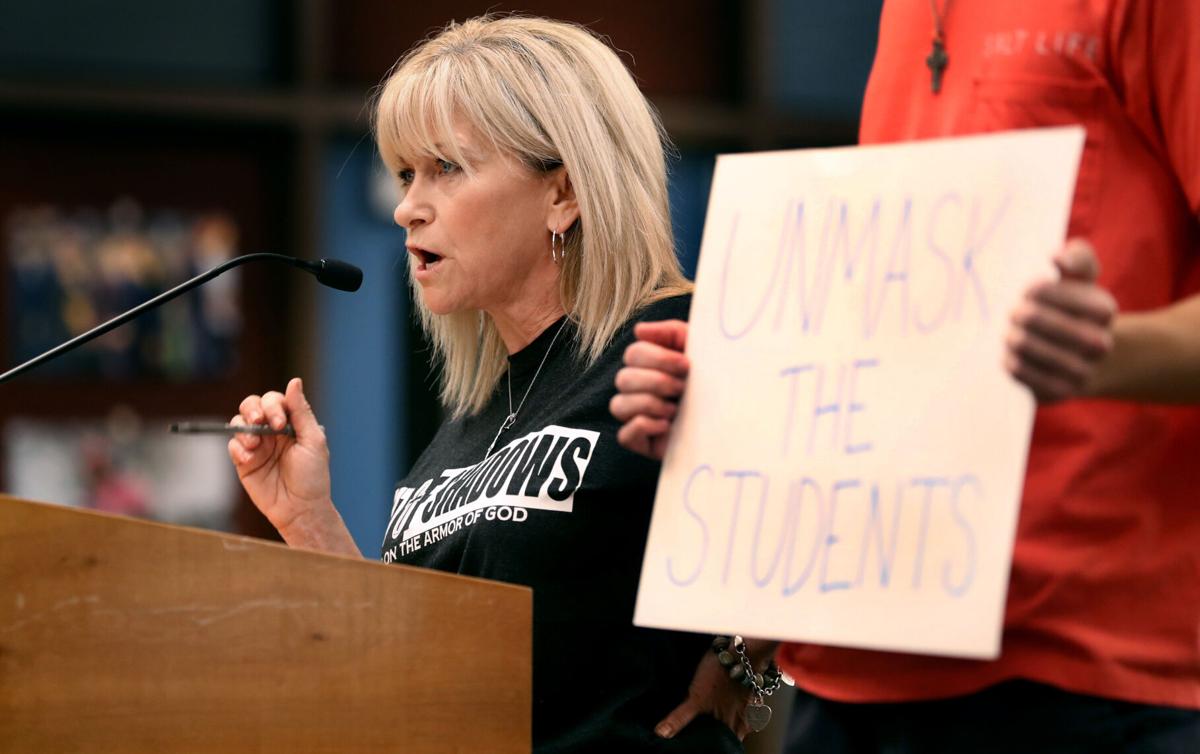Teaching was never an easy job, but controversy around the pandemic has made the job even harder, educators say, in some districts more than others.
The pushback of mitigation measures is often split along political lines, with more conservative districts, such as Vail and Marana, carrying the brunt of the controversy.
Verbally attacked, overworked, scrutinized and exhausted are some of the experiences teachers said they are dealing with in an environment where public health measures such as mask wearing, social distancing, quarantining and vaccines have turned into controversial trigger points, with educators under fire from angry parents and even colleagues.
“This community is ripped apart,” says Sandy Faulk, a teacher at a Marana K-8 school and former president of the district’s education association. “I’m not sure we’re ever gonna get back, to be honest.”
In large part, the Tucson Unified School District has avoided much of the controversy around masks and other COVID-19 mitigation measures, said Margaret Chaney, teacher and president of the district’s education association.
The vast majority of teachers and parents wanted a mask mandate, Chaney says. As well, the governing board was united in keeping a mandate.
Enrollment in TUSD has increased this school year, and Governing Board member Adelita Grijalva thinks it’s partly because TUSD has been so consistent and unanimous in requiring masks.
“I’m sure we have some teachers who would prefer not to have to wear a mask, but quite honestly, as long as everyone is compliant and we don’t have as many outbreaks, we’re going to continue with the mask requirements until CDC says we don’t have to.”
Unlike TUSD, in the Vail and Marana school districts, board members have been split on the issue of mask mandates. And in the Amphitheater district, even though there is a small but vocal group of community members who oppose the mask mandate, the governing board has been publicly united in keeping one in place for now.
There has been a group of community members showing up at every Amphi school board meeting for a few weeks to express their anger over the mask mandate, but that message is largely contained to the board meetings and not in schools, said Lisa Millerd, teacher and president of the district’s education association. Although, just like in Marana, teachers are feeling overworked and exhausted in large part because of staffing shortages, she says.
“Everybody’s plate that I talked to is full and overflowing,” she said.
The level of strain and COVID-19 exposure has created an environment in which people are often sick or have to quarantine, exacerbating teachers’ workload on top of already existing staffing shortages, educators say.
Pima County is currently in a state of high transmission for the COVID-19 virus. There have been nearly 3,000 cases in Tucson schools, 96 outbreaks and more than 8,000 people told to quarantine in a little more than two months. The vast majority of the COVID-19 cases in schools are in children, many of whom are younger than 12 and so not eligible for a vaccine.
Faulk is retiring at the end of next school year, but she doesn’t know how some of her younger colleagues are going to keep teaching in this climate.
“I didn’t sign up to be a teacher to be lambasted on Facebook and have parents want to pull kids out of my care because I wear a mask,” Faulk said.
The thought of leaving the profession has become a growing sentiment among educators, which would exacerbate an already existing problem throughout the state.
Faulk’s school, Twin Peaks K-8, is short-handed nearly every day, she said. Teachers find it difficult to take a day off even if they need one because there is often no one to cover for them.
Due to a severe substitute shortage, Marana administrators and other qualified staff have to cover classrooms when a teacher is out, says district spokeswoman Alli Benjamin.
More than a quarter of teaching positions across the state were still vacant a few weeks into last school year, and nearly half of filled positions were by people who do not meet standard teacher requirements, according to the Arizona School Personnel Administrators Association survey of 200 school districts and charters.
This year, there seems to be an even more severe shortage of support staff in roles like teacher aids, bus drivers and substitutes. Local school districts have recently raised the pay for all of these positions, but the shortages continue.
Anti-science pressure working
One of the reasons some districts do not impose a mask mandate is because of the controversy and pushback from parents, despite evidence that universal masking keeps kids in school.
Arizona schools with no mask mandate are 3½ times more likely to have a COVID-19 outbreak than those with one, according to a recent CDC report co-authored by Pima County health officials.
Protests at school board meetings often include parents who say their children hate wearing masks and have a hard time breathing, playing and interacting with other students. Another common complaint is that a mask mandate infringes on people’s civil liberties. It’s also common to see protestors showing up at school board meetings who do not have children in the district and sometimes don’t live in the community.
As protests at school board meetings have become more regular, board members in several school districts have been threatened. This is not isolated to Tucson, with the National School Boards Association, representing school board members across the nation, asking President Joe Biden recently for federal assistance in investigating and stopping threats over policies including mask mandates, according to the Associated Press.
And on Monday, Attorney General Merrick Garland directed federal authorities and law enforcement to look into increasing threats against school board members, teachers and other employees in public schools across the country, saying there has been “a disturbing spike in harassment, intimidation, and threats of violence.”
Jon Aitken, a Vail district father who has been on the governing board for seven years, is not going to run again after his term ends because of the verbal attacks he has received and the hardship his family has suffered.
Vail Unified has experienced a lot of controversy over masks and other mitigation measures, including anti-mask protesters shutting down a board meeting and a disgruntled father showing up at his son’s elementary school with threats to make a citizen’s arrest of the principal. That controversy has changed the district whose motto is “education is a community effort.”
Votes on the governing board used to be unanimous, but not anymore, and that new discord on the board is growing within the district as well, including within the administration, Aitken says.
“When we have tried to do things for the district like create a mask mandate, for example, many of the district leaders say, no we don’t want to anger the community. We don’t want to have confrontation. But, ironically, we ended up having confrontation, obviously,” he said.

A crowd yells through the doors of the Vail Education Center after being held out of the Vail School District governing board meeting April 27. The meeting was canceled when most of the crowd refused to wear masks or accept limits on the number of people allowed into the building.
Kids are stuck in the middle
Students are not isolated from the controversy around public health measures, in particular masking.
Teachers say their students feel stuck in the middle with mixed messages about vaccines and masks, that they continue to suffer with mental health and behavioral issues, that they have lost trust in authority figures to act in their best interest, and teachers see students bullying each other for either wearing or not wearing a mask.
As well, parents are pulling children from school because their district either has or does not have a mask mandate. Brittany Erickson-Stone pulled her children from the Marana school district earlier this year because she did not see any COVID-19 precautions in place, and there were no good options for schooling while kids are in quarantine, she said.
“At this point, with delta, it’s affecting kids a lot worse, and I’m really not willing to play Russian roulette with my children’s health,” she said. “If they’re not willing to do the things that they need to do to keep them safe, then I’m willing to do that myself.”
In her son’s classroom at Butterfield Elementary in Marana Unified, the desks were facing each other, with no dividers. Masks were optional at the time, and many of the children did not wear them, she says. Shortly after the school year started, about half her son’s class was sent into quarantine because of an exposure to a positive COVID-19 case — her son, who was wearing a mask, was not among them.
The Pima County Health Department’s quarantine guidelines, in line with the CDC, differ depending on whether the person is wearing a mask. Unvaccinated people not wearing a mask need to quarantine if they were within 6 feet of an infected person for 15 minutes or more over a 24-hour period. If both people are wearing a mask, that radius goes down to 3 feet.
So if an unvaccinated child is wearing a mask, they are less likely to be considered a close contact and told to quarantine.
Marana mom Amber Jones and her two children contracted COVID-19 before their district had a mask mandate.
“My kids were wearing masks the whole time,” she said. “What they were essentially doing was protecting other people, not the other way around.”
Jones homeschooled her kids last year, and when this year started, they were so excited to be back. Then the COVID-19 notifications started rolling in. And it wasn’t just once a week; it was multiple cases a day, Jones says. Her children, 9 and 6, are too young to be vaccinated, and she was getting worried.
Then her daughter started feeling unusually tired on a Sunday. By Monday both her children started to get runny eyes and stuffy noses. The whole family tested for COVID-19, and Jones and both her kids tested positive, despite Jones being vaccinated. She felt as if she had a bad sinus infection, lost her sense of smell and had body aches. And as she got sicker, she started to get angry.
“My kids are sick. My kids are out of school. This could have been avoided had we just tried every possible mitigation strategy that we knew existed. And we chose not to,” she said.
Jones’ kids are back in school, and once the district put a mask mandate in place — which was lifted this week — she noticed that the COVID-19 notifications slowed, from every day to hardly any. The number of positive cases in Marana Unified decreased by 42% to 80%, depending on the week, following implementation of a mask mandate.
“We have let the discussion become something about masks versus no masks,” Jones said. “We let it become something about liberties being taken away or parent choice. And that is not what we need to focus on. We need to focus on our goal — a common goal is that kids are in person, engaged in their learning. We all want that. We all want in-person learning for our kids, teachers want it, anti-maskers want it, maskers want it. And when we get clouded by all that other noise, we get further away from our goal.”






